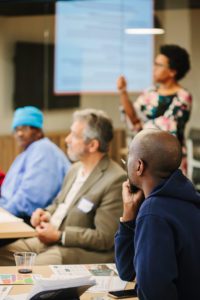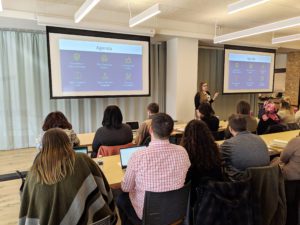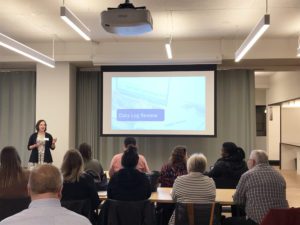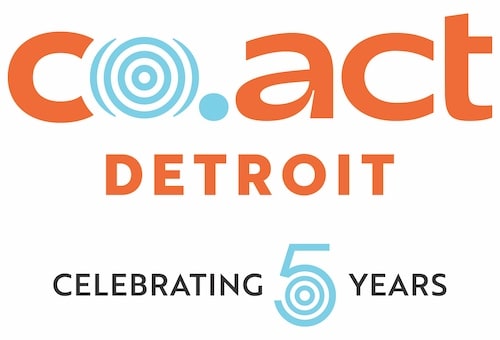 In the nonprofit communities of Southeastern Michigan, challenges that organizations face related to data access and analysis reflect the current and historic barriers in the areas they serve: walls of numbers and text that are costly to access and overwhelming to the naked eye; rivers of information that can be confusing and time-intensive to traverse.
In the nonprofit communities of Southeastern Michigan, challenges that organizations face related to data access and analysis reflect the current and historic barriers in the areas they serve: walls of numbers and text that are costly to access and overwhelming to the naked eye; rivers of information that can be confusing and time-intensive to traverse.
But for a large and growing number of organizations in the area, Data Driven Detroit (D3) plays a unique role in working through these barriers — a partner to help navigate obstacles and translate the flow of conversation happening around the table; a bridge over which people who historically cannot afford or reach vital information can not only gain access, but also gain understanding.
Since its founding in 2008, D3 has been driven by a mission which recognizes data points as representations of living, breathing people. A program partner of Co.act Detroit, D3 works to share locally-tailored, area-specific knowledge and resources with many of Detroit’s nonprofit organizations — including through the Co.Lab Connect and Data University programs hosted at Co.act.
We sat with Noah Urban, D3’s Director of Projects, who offered his reflections on the role of D3 in serving nonprofits in Detroit, shifting the balance of power in data collection and analysis, and fostering a culture of data use and sharing in Detroit’s nonprofit community.
On the benefits of partnership with Co.act Detroit:
Since our founding ten years ago, and prior to our partnership with Co.act, we’ve had AskD3, our online portal for community requests which we can answer, free of charge, if they take two hours or less. Through this service, we’ve been able to assist over 2,000 organizations and better understand community needs from wider angles.
Beyond being able to help people with simple, one-off data tasks, our exposure to challenges nonprofits face allows us to see patterns in terms of need. This gives us information to discuss with funders and say: “We’re seeing these patterns in demand, and in fact, some of these organizations are your grantees — is there an opportunity to address this in a more systemic fashion?” Our involvement now with AskD3 at Co.Lab Connect exposes us to a wider range of organizations, which only serves to accelerate that process for us and for the communities we’re working with.
 On the importance of data analysis for nonprofits:
On the importance of data analysis for nonprofits:
All nonprofits should be able to understand how they can use data to help them. I’m thinking in terms of data collection in particular, but also in terms of storytelling. Everything a nonprofit does creates data. That doesn’t necessarily mean you need a data analyst to be able to sift through it. You just need the proper tools to help you do it.
At D3 we do a lot of internal time tracking. It allows us to see, for example, if we’re spending twice as much time on internal meetings as we should be, and say “Let’s dial that back a little bit.” That’s still data. And you don’t need a data analyst to know that — you just need a time tracking software and a quick look at a graph.
Understanding just how pervasive information is in our lives, and how much it can help to use it, is important. It takes tools, yes, but sometimes those tools can be free or very inexpensive, and sometimes it’s surprising seeing how much can be done with some very simple templates. That’s what we’re hoping to promote through the Data University and the Co.Lab Connect services.

On how cultures of data awareness can help to change conversations between funders and grantees:
Often, funders are focused on relatively enormous systems change indicators which may not see visible progress for a very long time, and which are in a lot of cases really, really challenging to measure. Nonprofits are often the ones who are collecting the data and the information that can add back up to those indicators, but they often work at a more tactical level, and as such, they tend to need information that updates more frequently than the large systems change indicators.
So, within this dynamic, the nonprofit sector needs more support in terms of internal data management practices and staffing, because data analysis and collection are really expensive and time-intensive. However, it’s not only about getting nonprofits set up with stronger data management systems. It’s also about organizations internalizing awareness of the uses, limits and potentials of data — about building a culture of data use.
Having that deep understanding of data can help grantees and funders converse on a more even footing and operate from a shared basis of understanding. For us, that means helping more organizations regularly use the data that they’re collecting, so they can identify what’s important for them, measure what they want to impact, and then say to funders: “Hey, look, this is the thing that we’re tracking internally that ladders back up to this, this is what matters to us — and, here’s how it can matter to you.” But without having that culture of data use ingrained in an organization — at all levels, from junior staff to senior leadership — it’s a lot harder to make that argument.
